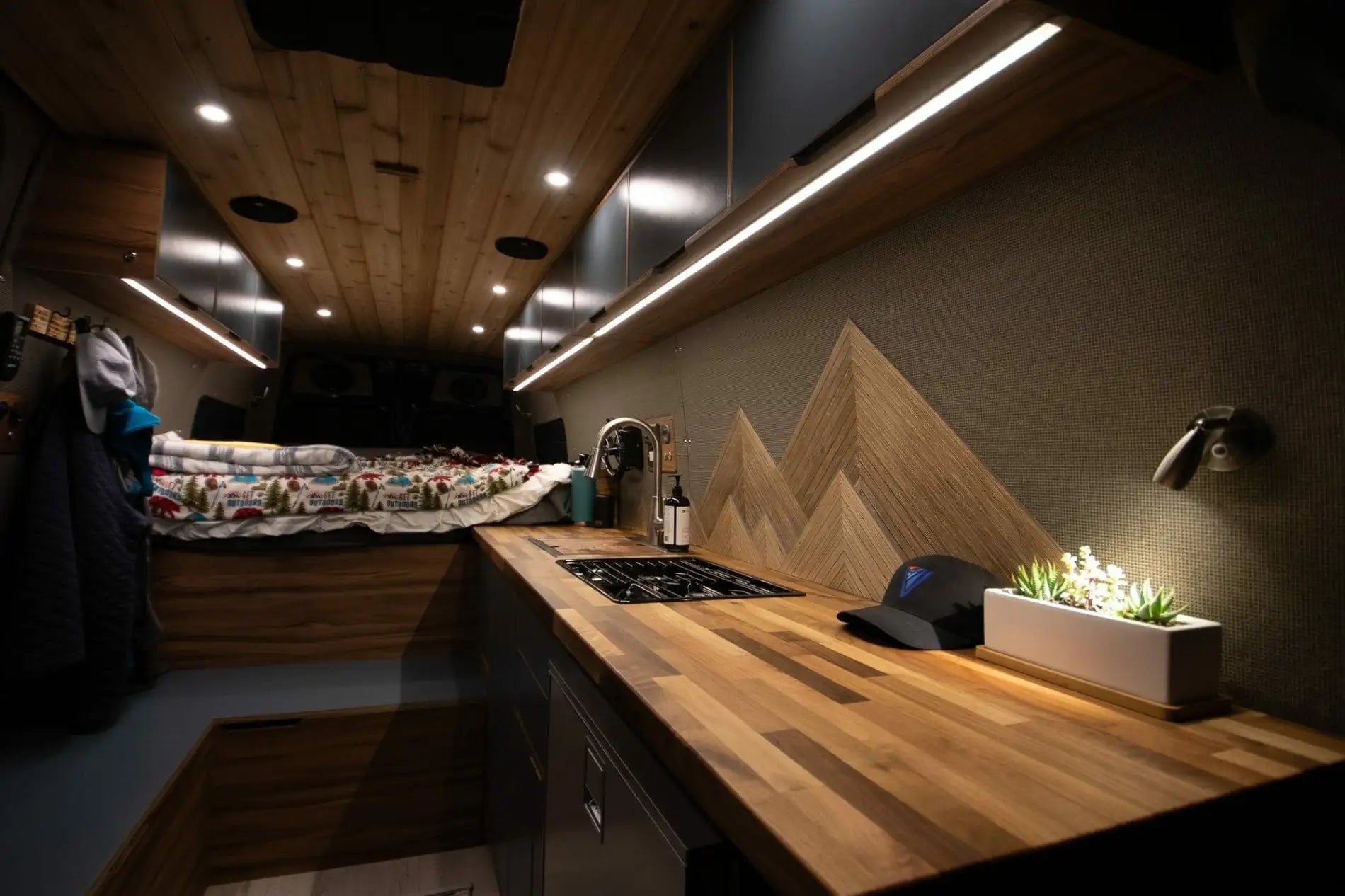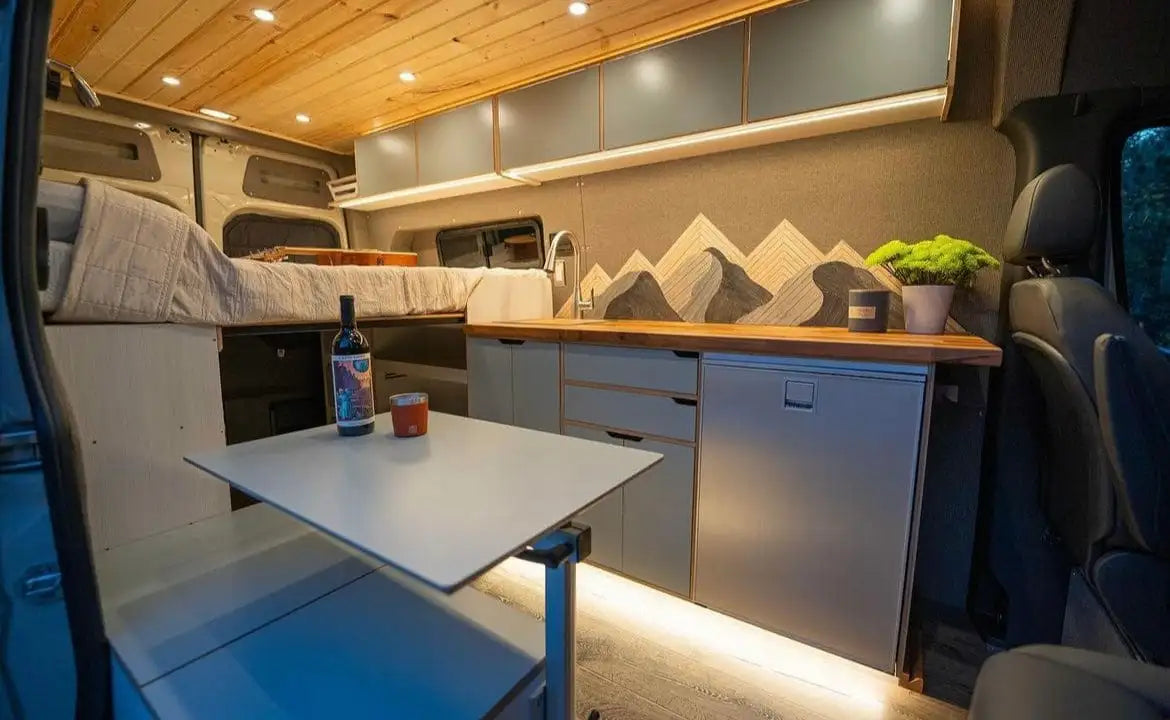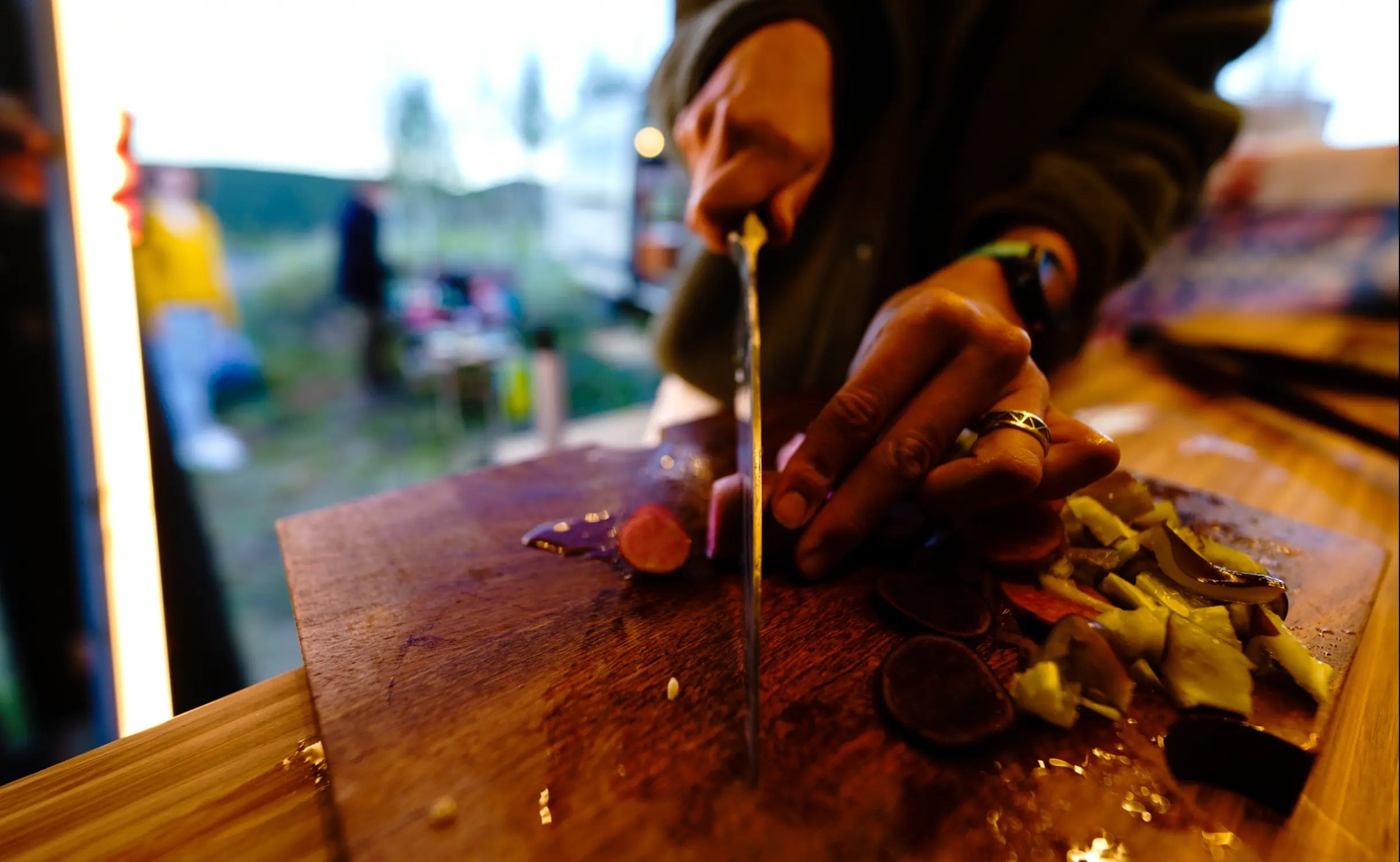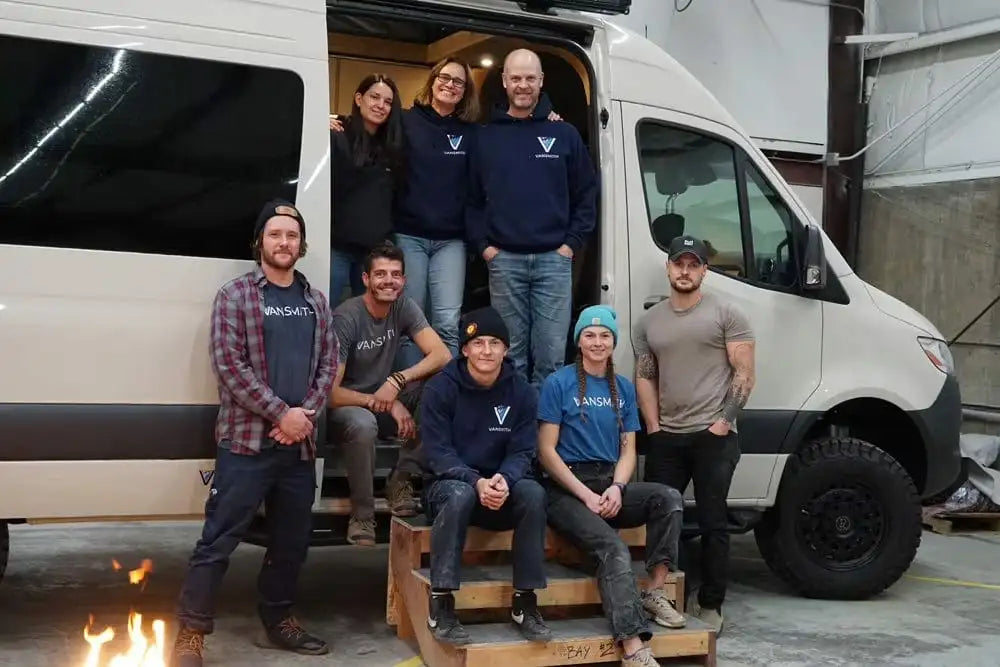
By Roberto, CMO and Co-founder
Mastering van cooking transforms road trips from expensive restaurant hopping into culinary adventures. Simple techniques and smart ingredient choices create delicious meals in compact kitchens. These proven recipes and strategies help you eat well while exploring the open road.
Why Van Cooking Beats Eating Out
Restaurant costs add up quickly during extended travels. A family can spend $100+ daily on meals while exploring new destinations. Home cooking in your van reduces food costs by 70% or more.
Fresh ingredients provide better nutrition than processed road food. You control sodium levels, preservatives, and ingredient quality completely. Additionally, cooking familiar foods helps maintain routine during constant travel.
Social benefits emerge when cooking becomes part of the adventure. Campfire conversations happen naturally around food preparation. Moreover, sharing meals with fellow travelers creates lasting friendships and memorable experiences.
Essential Van Cooking Equipment
Compact Cooking Appliances
Two-burner stovetops provide adequate cooking capacity for most van kitchens. Propane units offer instant heat control and reliable performance. Electric induction cooktops work well with robust solar systems but require compatible cookware.
Combination microwave-convection ovens maximize functionality in minimal space. These versatile appliances handle everything from reheating to baking. However, power consumption requires careful battery management and generator backup.
Instant Pots revolutionize van cooking with pressure cooking, slow cooking, and rice making capabilities. One appliance replaces multiple pots and dramatically reduces cooking times. Furthermore, sealed cooking prevents odors and moisture buildup.
Smart Storage Solutions
Magnetic spice containers utilize vertical surfaces efficiently in compact van kitchens. Clear labels and consistent sizing create organized, accessible seasoning systems. Additionally, magnetic mounting prevents spills during travel.
Nesting cookware sets maximize storage while providing complete cooking capability. Quality stainless steel or hard-anodized aluminum performs well and lasts longer. Moreover, removable handles allow flexible storage configurations.
Collapsible containers adapt to changing storage needs throughout trips. Silicone bowls, colanders, and measuring cups compress when not needed. These space-savers prove invaluable in efficiency-focused van cooking setups.
Van Cooking Breakfast Recipes
One-Pan Breakfast Hash
This hearty meal combines potatoes, vegetables, and protein in a single skillet. Dice potatoes small for faster cooking and fuel conservation. Add onions, peppers, and pre-cooked sausage for complete nutrition.
Create wells in the hash for cracking eggs directly into the pan. Cover and cook until eggs reach desired doneness. Additionally, cheese sprinkled on top adds richness and helps bind ingredients together.
Prep vegetables the night before to streamline morning van cooking routines. Store diced ingredients in sealed containers to prevent oxidation. Moreover, par-cooking potatoes saves significant time and propane consumption.
Overnight Oats Variations
No-cook breakfast options eliminate morning fuel usage and preparation time. Combine oats, milk, and sweeteners in mason jars before bed. Refrigeration overnight creates creamy, ready-to-eat breakfast.
Flavor combinations keep breakfast interesting throughout extended travels. Try apple cinnamon, berry vanilla, or chocolate peanut butter variations. Additionally, fresh fruit additions provide vitamins and natural sweetness.
Batch preparation simplifies van cooking routines for busy travel days. Prepare three to four jars simultaneously for grab-and-go convenience. Furthermore, reusable containers reduce waste while maintaining food freshness.
Lunch Ideas for Van Life
Mediterranean Wrap Assembly
Tortillas provide portable, mess-free meal foundations perfect for outdoor dining. Hummus spreads easily and adds protein plus fiber. Layer cucumber, tomatoes, olives, and feta cheese for authentic Mediterranean flavors.
Prep ingredients in advance during slower travel days. Pre-cut vegetables store well in airtight containers for several days. Additionally, assembled wraps travel better than loose salad components.
Variations prevent menu fatigue during extended van cooking adventures. Substitute different proteins, vegetables, or spreads to create new flavor profiles. Moreover, local ingredients discovered while traveling add regional flair.
Cold Pasta Salad
Pasta salads require no reheating and improve in flavor over time. Cook pasta during cooler morning hours to avoid heating the van interior. Rinse with cold water immediately to stop cooking and cool quickly.
Dressing combinations transform simple pasta into exciting meals. Italian vinaigrette, pesto, or ranch dressing each create different flavor profiles. Additionally, protein additions like chickpeas or chicken enhance nutritional value.
Storage in sealed containers prevents contamination and maintains freshness. Properly stored pasta salad lasts 3-4 days under refrigeration. Furthermore, individual portions simplify serving and reduce waste.
Dinner Solutions for Van Cooking
Sheet Pan Meals
One-pan dinners minimize cleanup while maximizing flavor in efficient van cooking. Combine protein and vegetables on a single baking sheet with seasonings. Roasting concentrates flavors while requiring minimal attention.
Timing varies based on ingredient density and desired doneness. Start dense vegetables first, adding quicker-cooking items later. Additionally, uniform sizing ensures even cooking throughout the pan.
Foil lining simplifies cleanup after cooking and prevents stuck-on residue. Parchment paper provides non-stick benefits without environmental concerns. Moreover, proper ventilation prevents moisture buildup during oven use.
Campfire Cooking Options
Outdoor cooking extends your kitchen beyond the van's interior walls. Cast iron Dutch ovens excel at braising, baking, and one-pot meals. Heat management requires practice but delivers exceptional results.
Foil packet meals contain ingredients while infusing flavors during cooking. Seal proteins and vegetables with seasonings for mess-free preparation. Additionally, individual packets allow customized meals for different dietary preferences.
Safety considerations include proper fire management and carbon monoxide prevention. Never cook inside the van with charcoal or wood fires. Moreover, fire extinguishers and first aid supplies should remain easily accessible.
Meal Planning and Grocery Shopping
Weekly Menu Planning
Structured meal planning prevents food waste and reduces grocery costs. Plan breakfast, lunch, and dinner for each travel day. Additionally, account for eating out occasionally to experience local cuisine.
Ingredient overlap between recipes maximizes efficiency and reduces storage needs. Use similar vegetables across multiple meals to prevent spoilage. Moreover, versatile proteins like chicken or eggs work in numerous preparations.
Backup meal options accommodate unexpected delays or cooking challenges. Canned soups, pasta, or sandwich ingredients provide reliable alternatives. Furthermore, non-perishable emergency meals ensure food security in remote areas.
Smart Shopping Strategies
Local farmers markets provide fresh, regional ingredients while supporting communities. Seasonal produce costs less and tastes better than shipped alternatives. Additionally, vendors often share cooking tips and preparation suggestions.
Bulk buying works well for non-perishable staples like rice, beans, and spices. However, limited storage requires careful quantity management. Moreover, consider expiration dates when purchasing larger quantities.
Resupply timing depends on refrigeration capacity and travel routes. Plan grocery stops every 3-5 days for fresh produce. Furthermore, research store locations along planned routes to avoid detours.
Van Cooking Safety and Hygiene
Food Safety Considerations
Temperature control prevents foodborne illness during van travel. Keep cold foods below 40°F and hot foods above 140°F. Additionally, minimize time in the danger zone between these temperatures.
Hand washing facilities may be limited during boondocking adventures. Sanitizing gel provides backup when soap and water aren't available. Moreover, clean utensils and surfaces prevent cross-contamination.
Water quality varies significantly across different regions and sources. Filtration systems improve taste and remove contaminants. Furthermore, boiling questionable water eliminates most harmful microorganisms.
Kitchen Organization
Designated storage locations prevent ingredients from becoming projectiles during travel. Secure latches and non-slip mats keep items in place. Additionally, cushioning protects fragile items from road vibrations.
Cleaning supplies should be easily accessible but safely stored. All-purpose cleaners handle most van cooking cleanup needs efficiently. Moreover, microfiber cloths pack small while providing superior cleaning capability.
Waste management requires planning in remote areas without regular pickup services. Compostable scraps can be buried appropriately or saved for compost facilities. Furthermore, recycling awareness helps protect natural areas we visit.
Elevating Your Van Cooking Experience
Van cooking doesn't mean sacrificing flavor or nutrition for convenience. Smart planning, quality equipment, and simple techniques create memorable meals anywhere you park. These strategies transform cooking from chore into adventure highlight.
Practice recipes at home before hitting the road to identify potential challenges. Familiarity with techniques builds confidence for cooking in new environments. Additionally, home testing reveals necessary equipment adjustments or substitutions.
Ready to upgrade your van kitchen for better cooking adventures? Our design team specializes in efficient layouts that maximize cooking functionality. Contact us to explore kitchen solutions that make van cooking a joy rather than a struggle.




